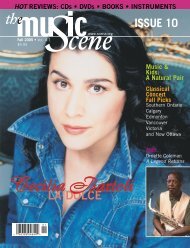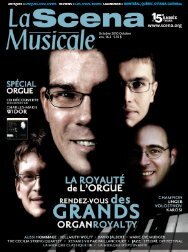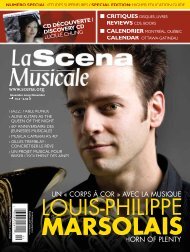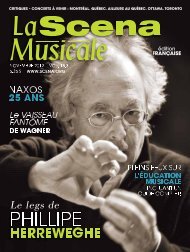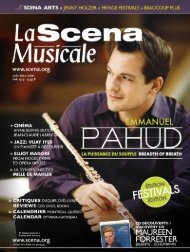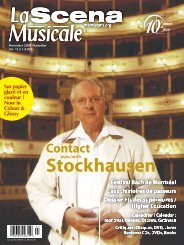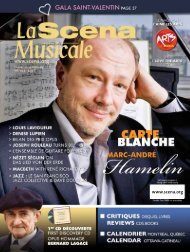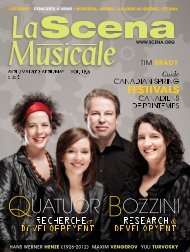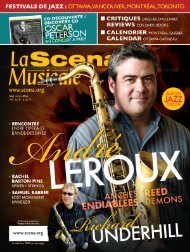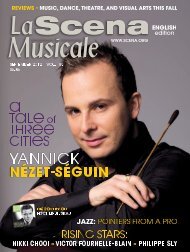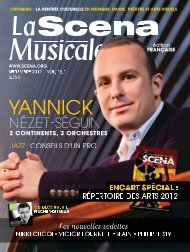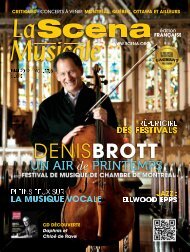Create successful ePaper yourself
Turn your PDF publications into a flip-book with our unique Google optimized e-Paper software.
MUSICULTURE<br />
IN MEMORIAM<br />
Maryvonne Kendergi<br />
by LOUISE BAIL<br />
Author of Maryvonne Kendergi, <strong>La</strong> musique en partage (Hurtubise HMH, 2002)<br />
cabin and writes things and then sends them out into the world,” Mazzoli<br />
agrees. “But I think that that’s really outdated.” For many musicians<br />
today, composing seems to be as much about absorbing culture<br />
as it is about creating it.<br />
“Music that only you can write”<br />
It was, however, exactly this appetite for varied influences that Pulitzer<br />
Prize-winning critic Justin Davidson attacked in a March 2011 New<br />
York Magazine piece. Naming, among others, Muhly and Mazzoli as<br />
part of “an omnivorous generation of composers” who “go merrily<br />
Dumpster-diving in styles of the past and of distant parts,” he concludes<br />
that “with their range of choices oppressively wide… [their<br />
music] bristles with allusions and brims with ambition—yet it somehow<br />
feels stifled by all that freedom.” Is this the future that Alex Ross<br />
described, when “reproduction will displace production” and “new<br />
music will consist of rearrangements of the old”?<br />
When The Wall Street Journal asked him to comment on Davidson’s<br />
argument, Muhly replied: “That’s just a boring ages argument…<br />
[like] people who are horrified that now that you can get Thai green<br />
chillies in the supermarket, every hausfrau can cook up a curry. It’s<br />
the end of the world! It’s always been the case that young artists have<br />
more access to more things and the only question is whether you have<br />
the skills to use them.”<br />
It’s true that in other streams of music, such as rock or jazz—or classical<br />
music before the 20 th century—innovating on established forms<br />
is not considered uncreative pastiche. Mazzoli believes the sum of varied<br />
influences can in fact be the key, paradoxically, to a unique voice.<br />
“You have to write the music that only you can write,” Mazzoli says. But<br />
that springs from “the sum of all your influences and experiences—<br />
which are really unique to you. I try to write music that is really of my<br />
time and place in the world. I’m not trying to recreate things that happened<br />
in the fifties, sixties, or even the nineties. My music comes from<br />
a lot of different places. The music that I like the best—whether it’s<br />
classical or pop or whatever—always has this element of familiarity<br />
mixed with a lot of great surprises.”<br />
The greatest surprise of all may be how we classify indie classical in<br />
fifty years. A marketing and media attempt to popularize instrumental<br />
music? Chronologically in a music history book some pages after<br />
minimalism? A death knell for classical music as a mainstream genre,<br />
the parallel to what Dylan or Davis going electric signalled for folk and<br />
jazz? Forgotten?<br />
Regardless, Mazzoli has one hope; that, “in the future, people will<br />
really still be listening to the music.”<br />
Perhaps she’s right. Perhaps the music can speak for itself.<br />
LSM<br />
Warhol Dervish plays Muhly, Mazzoli, and Parry at Sala Rossa, followed by The Youjsh<br />
(another genre-busting ensemble). December 18 at 9 p.m. For more information<br />
on Warhol Dervish and the concert, visit www.violalotus.tumblr.com<br />
This article is the first in a series exploring new music in a social context. Next edition—<br />
The rise of start-up ensembles: what’s behind the musical entrepreneurship trend?<br />
ON SEPTEMBER 27, 2011, Maryvonne Kendergi, a beacon of<br />
modern music in Quebec known as “the grandmother of composers”<br />
or the “great lady of music,” gently passed away at the age of 96.<br />
The title of Kendergi’s memoirs, <strong>La</strong> musique en partage, aptly<br />
describes the personal and professional<br />
life of the composer, who used<br />
her talents in the service of those<br />
close to her and shared her savings<br />
with those less fortunate.<br />
Her accomplishments demonstrated<br />
her exceptional gifts as a presenter<br />
and organizer. The broadcast<br />
series Festivals européens (1956-<br />
1963), where she reported on works<br />
from the great festivals of Europe,<br />
opened the doors to her brilliant career<br />
in radio. In 1961, with Pierre<br />
Mercure and Serge Garant, she organized<br />
the Semaine internationale<br />
de musique actuelle.<br />
At the instigation of Pierre Mercure, she helped establish the Société<br />
de musique contemporaine du Québec in 1966 alongside Serge<br />
Garant, Jean Papineau-Couture, Hugh Davidson and Wilfrid Pelletier.<br />
In 1967, she joined the University of Montreal’s Faculty of<br />
Music. In 1970, she created and organized the ‘Musialogues.’ In 1980,<br />
she readily lent her support to the Association pour l’avancement de<br />
la recherche en musique du Québec (ARMuQ, . now known as the Société<br />
québécoise de recherche en musique or SQRM), becoming its<br />
first president. She also donated the Maryvonne Kendergi fund to<br />
the UdeM, from which scholarships are awarded annually to musicology<br />
students.<br />
Of Armenian origin, she was born during the First World War, on August<br />
15, 1915 in Aintab (Gaziantep), on the southern border of modern<br />
Turkey. Survivors of genocide, her family moved to Aleppo, Syria. In 1928,<br />
the young Maryvonne completed her primary schooling with the Sisters<br />
of the Franciscan Missionaries of Mary, where she studied piano, discovering<br />
her musical vocation. She went to France to pursue her music<br />
studies at the École Normale de Musique in Paris with Nadia Boulanger.<br />
There, she completed a teaching degree (1933) before returning to the<br />
Middle East to try out a career as a concert artist (1933-1937).<br />
During the war, she helped prisoners and refugees, organized food<br />
banks, and supported the rescue networks for Jewish children. After<br />
the war, thanks to the friendships she had developed during this period,<br />
she was entrusted with the organization and management of<br />
cultural activities at the Cité Universitaire de Paris (1945-1952).<br />
While there, she rubbed shoulders with composers who introduced<br />
her to avant-garde music.<br />
She left Gravelbourg, Saskatchewan after four years in June 1956<br />
to pursue a concert career in Paris, little knowing that as she passed<br />
through Montreal, Marc Thibault, director of the French radio network,<br />
would succeed in keeping her there with this prescient statement:<br />
“Would you like to do what you are made to do?”<br />
Wherever she went she carried with her a deep attachment to her<br />
Armenian roots, a steadfast appreciation for France, the country<br />
that gave her its language and culture, and an unequivocal allegiance<br />
to Quebec, where she eventually settled.<br />
LSM<br />
TRANSLATION: LYNN TRAVERS<br />
16<br />
DECEMBER 2011 / JANUARY 2012



